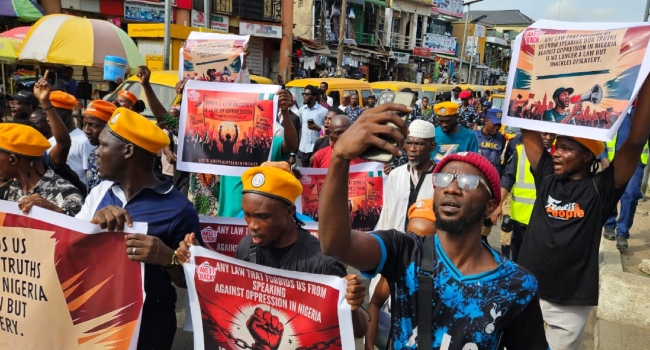Youths across several states in Nigeria took to the streets on Monday under the aegis of the #TakeItBack Movement to protest against the controversial Cybercrime Act, worsening economic conditions, and recent political developments in Rivers State. The protests, which occurred simultaneously in cities including Abuja, Lagos, Port Harcourt, Yobe, Osogbo, and Ibadan, were met with a heavy police presence and in some cases, forceful dispersal using tear gas.
In Abuja, security operatives deployed tear gas canisters to disperse protesters in the Maitama area of the Federal Capital Territory. The rally, led by human rights activist and former presidential candidate, Omoyele Sowore, disrupted the grand finale of the National Police Day celebrations at Eagle Square. Traffic diversions enforced by the police around the venue led to gridlocks in parts of the city.
Speaking during the rally, National Coordinator of the #TakeItBack Movement, Juwon Sanyaolu, said the protests were in response to “increasing authoritarianism” and deteriorating living conditions. Protesters clad in orange berets carried placards bearing inscriptions such as “Stop the Repression” and “Let Us Breathe.”
Tensions also flared in Rivers State, where security operatives clashed with protesters before dispersing them with tear gas. Some demonstrators alleged physical assault by the police. The state coordinator of the movement, Amanye King, accused security forces of suppressing citizens’ voices. “We are here to peacefully demand the return of our elected governor and the dissolution of the unconstitutional Sole Administrator arrangement,” he said.
In Yobe State, the protest was halted even before it began. Security forces arrested the state coordinator of the movement, Abubakar Jawa, alongside four others—Mohammed Kayeri Adam, Suleiman A. Gambo, Maimuna Abba, and Abubakar Jawa—while they were gathering ahead of the march. The police, however, denied knowledge of the arrests. Yobe State Police Public Relations Officer, Dungus Abdulkarim, claimed the force was not holding any protesters and had offered to provide security had the group officially contacted them.
In Lagos, demonstrators converged at the Ikeja Under Bridge and proceeded in a procession toward the Lagos State House of Assembly. However, they were barred from accessing the complex by a barricade of police officers. Protesters intended to submit a letter of grievance to the Assembly but were denied entry. No state official addressed the crowd.
Similar scenes unfolded in Osun State, where demonstrators marched through major roads in Osogbo carrying banners that condemned the Cybercrime Act. State Coordinator of the movement, Lijofi Victor, called on President Bola Tinubu to intervene and repeal the legislation. “We say no to laws that criminalise free speech. Many Nigerians are being arrested for simply expressing their opinions,” he said.
In Ibadan, Oyo State, protesters marched through the Iwo Road axis, warning against what they described as a trend of repressive legislation. The State Coordinator, Dimeji Salako, stated that citizens would not be silenced by intimidation and urged lawmakers to prioritise good governance.
Reacting to the widespread clampdown on protests, Amnesty International Nigeria condemned the actions of security operatives in Abuja, Port Harcourt, and Yobe, describing the attacks on peaceful protesters and journalists as “unacceptable.” The human rights group demanded an independent investigation into the reported beatings and unlawful arrests.
“Amnesty is deeply concerned by security forces’ attacks on protesters. In Damaturu, Yobe, four activists have been unlawfully arrested. These atrocities must not go unpunished,” the organisation stated.
In the wake of the protests, the Federal Government reiterated its recognition of the right to peaceful assembly but issued a stern warning against the destruction of national infrastructure. Speaking at a press conference in Abuja, Minister of Youth Development, Ayodele Olawande, expressed empathy for the demonstrators’ cause but urged restraint.
“Everyone has the right to protest. If I had the time, I would join them,” Olawande said. “However, we must ensure protests remain peaceful and do not threaten public infrastructure. Let us all show responsibility while exercising our freedoms.”
Despite the disruptions and arrests, the #TakeItBack Movement vowed to continue its protests until the Cybercrime Act is repealed. Organisers have hinted at another round of nationwide demonstrations in August if their demands remain unmet.

